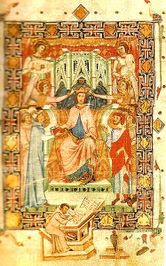In the case of James, the marriage was supposed to be with Amicie de Montfort, the daughter of Simon IV de Montfort, the 5th Earl of Leicester. This was not a simple alliance, though. Simon was leading the Albigensian Crusade in an attempt to exterminate Catharism. Peter, on the other hand, was supporting the Cathars, who believed in leading a "pure" life, rejecting materialism. Unfortunately for the Catholic Church, they also rejected the idea of the Trinity.
Peter hoped that making a marriage between his son and Simon's daughter could give Peter an edge to hold off Simon's crusade. It should be noted that both children were less than two years old at the time of the discussions. Peter even sent James to Montfort's care in 1211, to be raised in his household.
Simon and the Albigensian Crusade did not falter, however, and the two sides met in battle. On 12 September 1213, Peter and Simon's forces met in the Battle of Muret, in which Simon's smaller force defeated the much larger alliance of Peter II and Raymond IV of Toulouse. Peter II was killed in this battle.
Simon now had the next king of Aragon—who was only a few years old—in his possession. He could have turned this into a huge political advantage and managed to possess Aragon, or at least force himself onto the country as Regent for James. The Aragonese, however, would not have it. They appealed to Pope Innocent III, who demanded that Simon relinquish custody of James, which he did in 1214 to the papal legate Peter of Benevento.
The six-year-old James was handed over to the head of the Knights Templar in Aragon, one Guillem de Montredó. Aragon was being managed by James' great-uncle Sancho and cousin Nuño, respectively Counts of Provence and Cerdanya. They were not doing a good job, supposedly, and in 1217 the Templars brought James back to the capital and enlisted the aid of loyal nobles to help him rule.
In 1221, at the age of 14, he was married to the 19-year-old Eleanor of Castile, the daughter of Alfonso VIII of Castile (mentioned here and here). The next half-dozen years were tumultuous for him. We'll take a look at his troubles next time.


